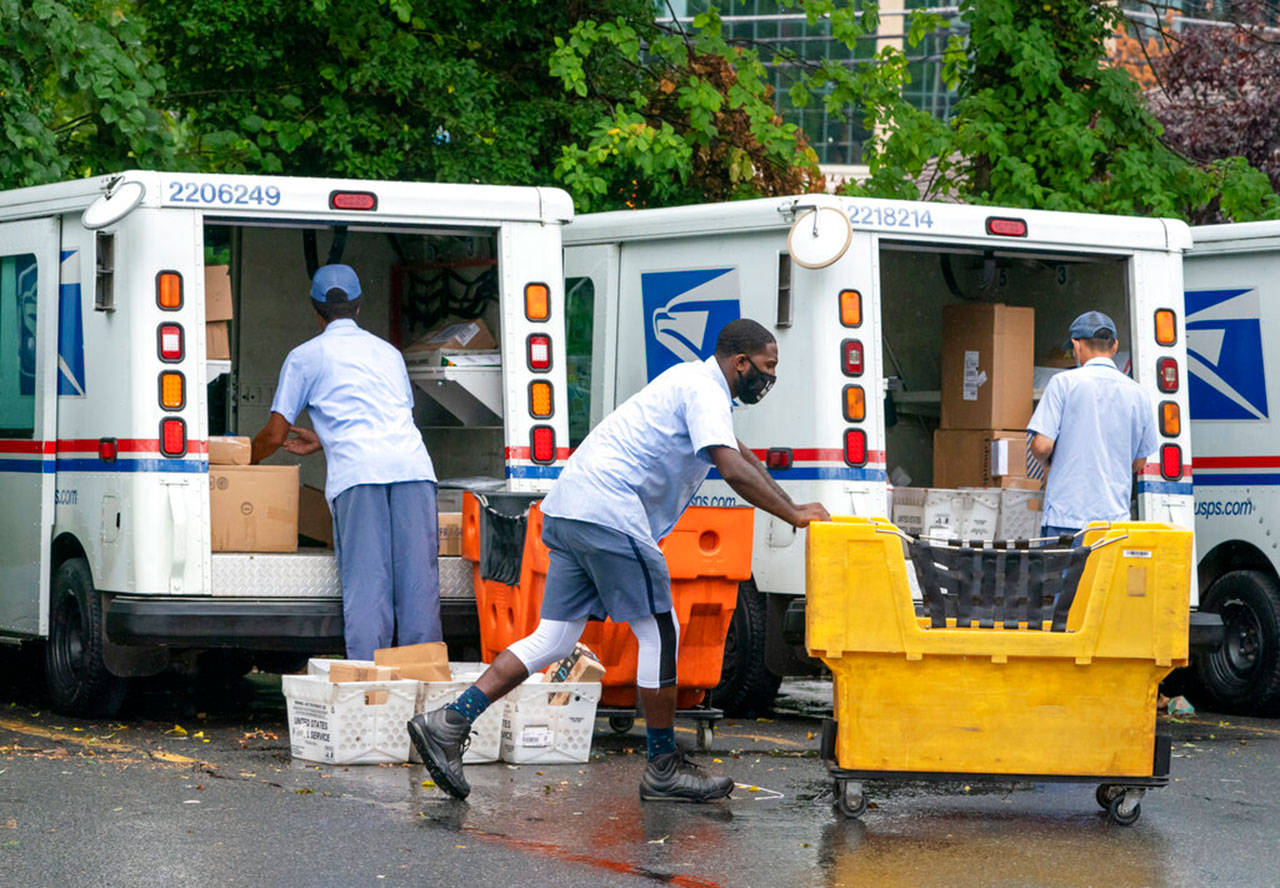By The Herald Editorial Board
Almost all will have heard about President Trump’s remarks Thursday that he would reject emergency funding for both the U.S. Postal Service and election aid for states in the next pandemic relief package because he wants to limit the ability of voters to cast their ballots by mail, which he has deemed — without evidence or explanation — as fraught with fraud.
Back in April, Trump claimed — again without proof — that mail-in ballots and other measures to improve voter access during the pandemic, would “if you’d ever agreed to it, you’d never have a Republican elected in this country again.”
Never mind that studies have found no benefit to either Democrats or Republicans in universal vote-by-mail elections and scant incidence of actual fraud with such elections.
Trump then followed Thursday’s remarks by walking them back to indicate he wouldn’t veto a financial package over aid to the post office; a day after he and Melania Trump requested their absentee ballots for their Mar-a-Lago address in Florida.
Once again, Americans were left to ponder what Trump actually meant and which statements to believe. They shouldn’t however, doubt the lack of commitment to either the post office or the election.
The lack of resolution over aid to the U.S. Postal Service and to the states for elections will remain unsettled at least for the next few weeks. House Democrats, in the package they adopted in May, included $25 billion in aid for the post office and $3.6 billion to assist states with the November election. But a deal with the Republican-controlled Senate and the White House has lagged and Congress has now left town until Sept. 7.
That will leave only a matter of weeks between Congress’ return and the Nov. 3 election to resolve a growing crisis.
Friday, the postal service, in anticipation of increased requests for absentee ballots because of the pandemic, notified 46 states — including Washington state — that it could not guarantee that all ballots cast by mail for the November election would arrive in time to be counted. Washington state was one of seven states to receive a “narrow warning,” The Washington Post reported, meaning that USPS delivery standards could not meet state deadlines for a limited number of voters; election officials in 39 states received a “heightened warning,” involving greater numbers of voters.
Since Washington state went to all-mail balloting in 2011, county election officials have pleaded with voters to return their ballots on time, making sure they’re sent early enough to be postmarked by the day of the election. For this month’s primary election, as of Friday, 2,694 ballots arrived too late to be counted in Snohomish County elections, County Auditor Garth Fell said. That’s about 1 percent of the total ballots received. Fell anticipates a better rate of on-time ballots for the general election, as that has been the trend; although that assumes a normally operating post office.
That assumption now is uncertain, even if aid is forthcoming to the USPS.
Since taking office in May, Postmaster General Louis DeJoy has come under criticism for his attempts to rein in budget gaps at the post office. DeJoy, the first postmaster in 20 years not to advance through the ranks of the post office, is instead a former logistics executive and a major Trump and Republican campaign donor.
Earlier this month DeJoy made sweeping changes to the post office, displacing the top two executives in charge of day-to-day operations and reassigning 23 other postal executives. Such shake-ups can be effective, though the timing — coming just months after DeJoy’s arrival, during the pandemic and weeks before the election — takes an immense risk.
This also comes following a slate of cost-cutting measures intended to curb overtime and transportation costs that have recently slowed mail delivery, according to reports in The Post and elsewhere.
In an internal memo issued to USPS workers in July, DeJoy told employees to leave mail behind at distribution centers if it delayed carriers from their routes. In the past, postal workers were trained not to leave mail behind or to make multiple delivery trips to make the day’s deliveries. The memo also discourages carriers from using “park points,” in which carriers park mail trucks in certain locations and make deliveries on foot.
The USPS may indeed be in need of reform, especially as the nature of mail and package delivery has changed. It has seen a drastic drop in first-class and marketing mail, which had provided most of its revenue in years past. At the same time, the volume of package deliveries has increased dramatically.
Coming from a business background, DeJoy is taking the approach he knows best. In the memo to his employees he cites the case of U.S. Steel, which was slow to adapt to market forces and vanished. But DeJoy mistakes the post office for a for-profit business, when, instead, it was chartered in the U.S. Constitution as a service to the American people.
The coronavirus pandemic will not have passed before November’s election. Washington and four other states exclusively use mail-in ballots, and other states are preparing to expand access to absentee ballots to allow registered voters to participate safely in the election.
Just as we have always depended upon the U.S. Postal Service to deliver cards and letters, packages, newspapers, magazines, books, bills, medications and more, Americans are increasingly reliant on the post office and its employees as a vital link in the nation’s election infrastructure, delivering ballots to voters and then to county election offices.
The U.S. Postal Service and its employees should be allowed to continue their work as they always have, and the post office should be provided the funding it needs to continue that work through the pandemic and beyond.
Talk to us
> Give us your news tips.
> Send us a letter to the editor.
> More Herald contact information.

























